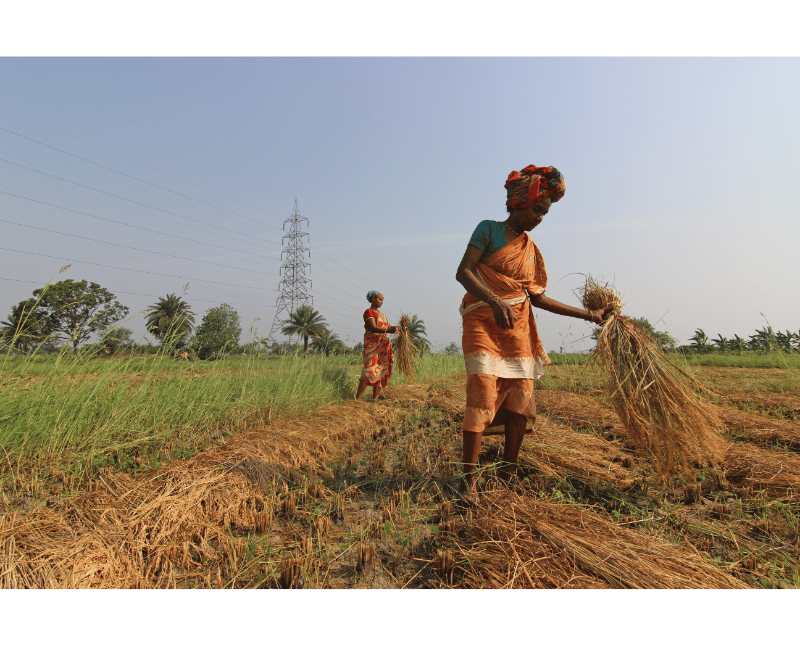Fertile Grounds of Change: Empowering Women as Agricultural Stewards Globally
This comprehensive article explores the global challenges faced by women in agriculture, drawing from provided data and additional insights. Delving into resource disparities, gender norms, market access, and climate vulnerability, it advocates for a nuanced global course of action—harmonizing policies, fostering collaboration, transforming market dynamics, promoting climate-resilient practices, and investing in educational empowerment—to empower women as pivotal contributors to global food security and sustainable agriculture.
Bureau of Society and Transformation
12/4/20233 min read


In the vast expanse of global agriculture, an underappreciated force is at play—the remarkable contributions of women as cultivators, entrepreneurs, and laborers. As the world confronts pressing issues of food security and grapples with the far-reaching impacts of climate change, the exclusion of women from the recognized identity of farmers emerges as a systemic impediment to progress.
Unveiling Global Realities:
While the provided article primarily drew from Indian data, it is essential to recognize that the challenges faced by women in agriculture transcend national borders. Globally, women contribute significantly to the agricultural workforce, representing approximately 43% of labor in developing countries, as per the Food and Agriculture Organization (FAO). This trend resonates across diverse regions, from the agricultural landscapes of Africa and Asia to the developed regions of Europe and North America.
Digging Deeper into Global Challenges:
Resource Disparities:
As women globally face barriers in accessing essential resources, including land, credit, and advanced agricultural technology, these disparities impede not only their individual progress but also the potential for broader agricultural innovation. According to the Annual Periodic Labour Force Survey (2021-2022), women make up 78% of India's employed labor in agriculture, showcasing a significant demographic engaged in the sector, yet largely excluded from the farmer identity.
Gender Norms:
The pervasive notion that farming is a predominantly male occupation continues to echo globally. Societal norms and stereotypes reinforce this bias, downplaying the essential role of women as agricultural stewards. This deep-rooted gender bias contributes to the systemic undervaluing of women farmers, hampering their socio-economic empowerment.
Market Access:
In a globalized world, market access is a critical determinant of economic success. Women farmers worldwide face challenges in integrating into global agricultural value chains, hindering their ability to secure fair prices and equitable terms. The 24% increase in female agricultural laborers in India between 2001 and 2011, as revealed by the Agriculture Census, reflects a shift in the sector's dynamics but also underscores the need for parallel changes in market dynamics.
Climate Vulnerability:
Climate change compounds the challenges faced by women farmers globally. The impacts of erratic weather patterns, water scarcity, and soil degradation disproportionately affect women, emphasizing the urgency of integrating climate-resilient agricultural practices into the global discourse on women's empowerment in agriculture.
A Multifaceted Global Course of Action:
International Policy Reforms: Harmonizing policies globally to ensure equal access to resources for women in agriculture is paramount. Land rights, credit facilities, and technological support must be addressed universally to dismantle systemic barriers hindering women's progress as farmers.
Collaborative Global Initiatives: The complexity of the issue necessitates collaborative efforts on a global scale. International organizations, governments, and NGOs must join forces to share best practices and implement initiatives that transcend geopolitical boundaries, recognizing the shared struggle of women in agriculture.
Transformative Market Dynamics: Efforts to integrate women farmers into global agricultural value chains require a comprehensive reevaluation of market dynamics. Partnerships with multinational corporations and fair trade organizations can be instrumental in fostering an inclusive environment that ensures fair prices and equitable terms for women farmers.
Climate-Resilient Agricultural Practices: A global commitment to promoting climate-resilient agricultural practices is essential. Providing women farmers worldwide with the knowledge and tools to adapt to changing climate conditions will not only bolster their resilience but also contribute to sustainable agriculture practices on a global scale.
Educational Empowerment: Investing in education and skill development programs for women in agriculture is a transformative step toward dismantling gender stereotypes and enhancing the capacity of women as farmers. This requires a global commitment to fostering environments that empower women through knowledge and skills.
Empowering women as agricultural stewards on a global scale requires a comprehensive understanding of the multifaceted challenges they face. By recognizing the shared struggles across regions, implementing international policy reforms, fostering collaborative initiatives, transforming market dynamics, promoting climate-resilient practices, and investing in educational empowerment, the world can pave the way for a future where women farmers are not only acknowledged but celebrated for their indispensable role in global food security and sustainable agriculture. The stakes are high, but the potential for positive change is equally profound. It is time to cultivate fertile grounds for change on a global stage.
(With AI Input)
Context:
Across the globe, the predominant visage of farming is feminine. According to the United Nations' Food and Agriculture Organization (FAO), a substantial majority of economically active women in the least-developed nations engage in agricultural work. However, pervasive gender-specific challenges, including limited access to land, financial resources, markets, agricultural education, favorable working conditions, and equitable treatment, systematically place female farmers at a considerable disadvantage long before they embark on the task of plowing a field or sowing a seed.
Impediment to Women in Agriculture:
Arguably, the major stumbling block revolves around land rights. In many developing countries, a mere 10 to 20 percent of landowners are women, and, in certain global regions, legal barriers still prevent women from owning or controlling land. This lack of empowerment for female farmers in land-related decisions creates a barrier, hindering their ability to engage in lucrative contract farming agreements that could otherwise offer enhanced income and stability.
Contacts
enquiry@economicnations.org
(xx) 98-11-937-xxx (On verification)
